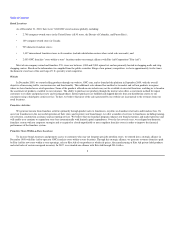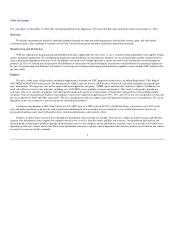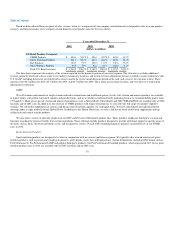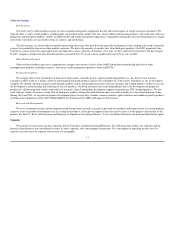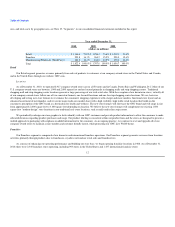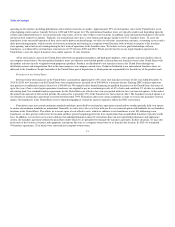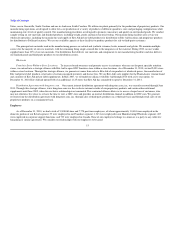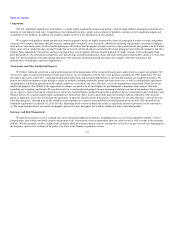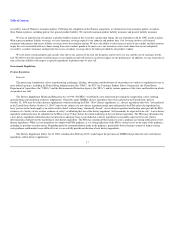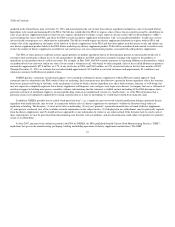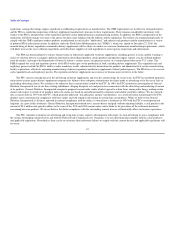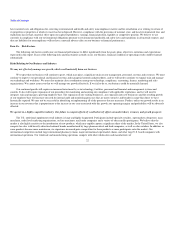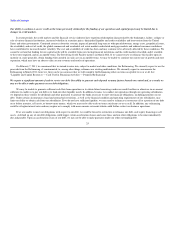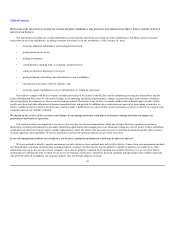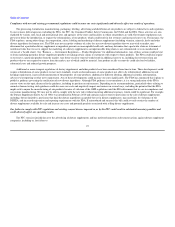GNC 2011 Annual Report Download - page 20
Download and view the complete annual report
Please find page 20 of the 2011 GNC annual report below. You can navigate through the pages in the report by either clicking on the pages listed below, or by using the keyword search tool below to find specific information within the annual report.
Table of Contents
marketed in the United States prior to October 15, 1994, and instead permit the sale of only those dietary ingredients included on a list of Accepted Dietary
Ingredients to be issued and maintained by the FDA. The bill also would allow the FDA to: impose a fine of twice the gross profits earned by a distributor on
sales of any dietary supplement found to violate the law; require a distributor to submit a yearly report on all non-serious Adverse Event Reports ("AERs")
received during the year to the FDA; and allow the FDA to recall any dietary supplement it determines with "a reasonable probability" would cause serious
adverse health consequences or is adulterated or misbranded. The bill also would require any dietary supplement distributor to register with the FDA and
submit a list of the ingredients in and copies of the labels of its dietary supplements to the FDA and thereafter update such disclosures yearly and submit any
new dietary supplement product labels to the FDA before marketing any dietary supplement product. If this bill is reintroduced and enacted, it could severely
restrict the number of dietary supplements available for sale and increase our costs and potential penalties associated with selling dietary supplements.
The FDA or other agencies could take actions against products or product ingredients that in its determination present an unreasonable health risk to
consumers that would make it illegal for us to sell such products. In addition, the FDA could issue consumer warnings with respect to the products or
ingredients in such products that are sold in our stores. For example, in May 2009, the FDA warned consumers to stop using Hydroxycut diet products, which
are produced by Iovate and were sold in our stores. Iovate issued a voluntary recall, with which we fully complied. Sales of the recalled Hydroxycut products
amounted to approximately $57.8 million, or 4.7% of our retail sales in 2008, and $18.8 million, or 4.2% of our retail sales in the first four months of 2009.
Through December 31, 2010, we estimate that we had refunded approximately $3.5 million to our retail customers and approximately $1.6 million to our
wholesale customers for Hydroxycut product returns.
DSHEA permits "statements of nutritional support" to be included in labeling for dietary supplements without FDA pre-market approval. Such
statements must be submitted to the FDA within 30 days of marketing. Such statements may describe how a particular dietary ingredient affects the structure,
function or general well-being of the body, or the mechanism of action by which a dietary ingredient may affect body structure, function, or well-being, but
may not expressly or implicitly represent that a dietary supplement will diagnose, cure, mitigate, treat or prevent a disease. A company that uses a statement of
nutritional support in labeling must possess scientific evidence substantiating that the statement is truthful and not misleading. If the FDA determines that a
particular statement of nutritional support is an unacceptable drug claim or an unauthorized version of a "health claim", or, if the FDA determines that a
particular claim is not adequately supported by existing scientific data or is false or misleading, we would be prevented from using the claim.
In addition, DSHEA provides that so-called "third-party literature", e.g., a reprint of a peer-reviewed scientific publication linking a particular dietary
ingredient with health benefits, may be used "in connection with the sale of a dietary supplement to consumers" without the literature being subject to
regulation as labeling. The literature: (1) must not be false or misleading; (2) may not "promote" a particular manufacturer or brand of dietary supplement;
(3) must present a balanced view of the available scientific information on the subject matter; (4) if displayed in an establishment, must be physically separate
from the dietary supplements; and (5) should not have appended to it any information by sticker or any other method. If the literature fails to satisfy each of
these requirements, we may be prevented from disseminating such literature with our products, and any dissemination could subject our product to regulatory
action as an illegal drug.
In June 2007, pursuant to the authority granted to the FDA by DSHEA, the FDA published detailed Current Good Manufacturing Practice ("GMP")
regulations that govern the manufacturing, packaging, labeling and holding operations of dietary supplement manufacturers. The GMP
18


